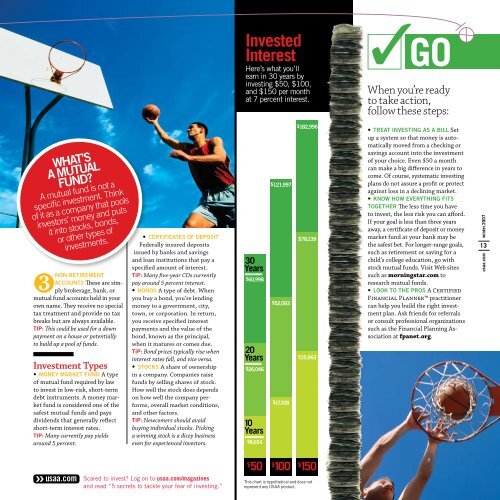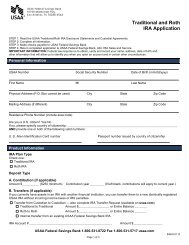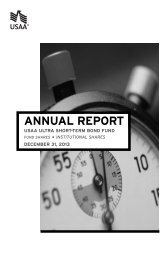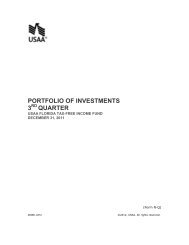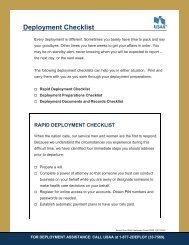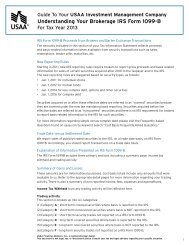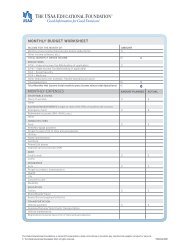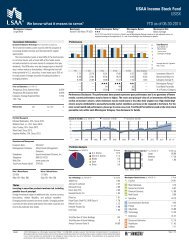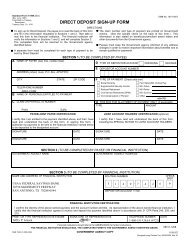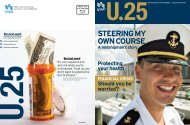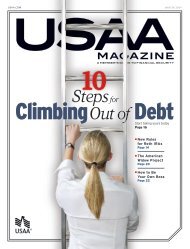Create successful ePaper yourself
Turn your PDF publications into a flip-book with our unique Google optimized e-Paper software.
Invested<br />
Interest<br />
Here’s what you’ll<br />
earn in 30 years by<br />
investing $50, $100,<br />
and $150 per month<br />
at 7 percent interest.<br />
Go<br />
When you’re ready<br />
to take action,<br />
follow these steps:<br />
What’s<br />
a mutual<br />
fund<br />
A mutual fund is not a<br />
specific investment. Think<br />
of it as a <strong>com</strong>pany that pools<br />
investors’ money and puts<br />
it into stocks, bonds,<br />
or other types of<br />
investments.<br />
❸non-retirement<br />
accounts These are simply<br />
brokerage, bank, or<br />
mutual fund accounts held in your<br />
own name. They receive no special<br />
tax treatment and provide no tax<br />
breaks but are always available.<br />
TIP: This could be used for a down<br />
payment on a house or potentially<br />
to build up a pool of funds.<br />
Investment Types<br />
• money market fund A type<br />
of mutual fund required by law<br />
to invest in low-risk, short-term<br />
debt instruments. A money market<br />
fund is considered one of the<br />
safest mutual funds and pays<br />
dividends that generally reflect<br />
short-term interest rates.<br />
TIP: Many currently pay yields<br />
around 5 percent.<br />
• certificates of deposit<br />
Federally insured deposits<br />
issued by banks and savings<br />
and loan institutions that pay a<br />
specified amount of interest.<br />
TIP: Many five-year CDs currently<br />
pay around 5 percent interest.<br />
• bonds A type of debt. When<br />
you buy a bond, you’re lending<br />
money to a government, city,<br />
town, or corporation. In return,<br />
you receive specified interest<br />
payments and the value of the<br />
bond, known as the principal,<br />
when it matures or <strong>com</strong>es due.<br />
TIP: Bond prices typically rise when<br />
interest rates fall, and vice versa.<br />
• stocks A share of ownership<br />
in a <strong>com</strong>pany. Companies raise<br />
funds by selling shares of stock.<br />
How well the stock does depends<br />
on how well the <strong>com</strong>pany performs,<br />
overall market conditions,<br />
and other factors.<br />
TIP: New<strong>com</strong>ers should avoid<br />
buying individual stocks. Picking<br />
a winning stock is a dicey business<br />
even for experienced investors.<br />
30<br />
Years<br />
$60,998<br />
20<br />
Years<br />
$26,046<br />
10<br />
Years<br />
$8,654<br />
$121,997<br />
$52,093<br />
$17,308<br />
$182, 996<br />
$78, 139<br />
$25,963<br />
• Treat investing as a bill Set<br />
up a system so that money is automatically<br />
moved from a checking or<br />
savings account into the investment<br />
of your choice. Even $50 a month<br />
can make a big difference in years to<br />
<strong>com</strong>e. Of course, systematic investing<br />
plans do not assure a profit or protect<br />
against loss in a declining market.<br />
• Know how everything fits<br />
together The less time you have<br />
to invest, the less risk you can afford.<br />
If your goal is less than three years<br />
away, a certificate of deposit or money<br />
market fund at your bank may be<br />
the safest bet. For longer-range goals,<br />
such as retirement or saving for a<br />
child’s college education, go with<br />
stock mutual funds. Visit Web sites<br />
such as morningstar.<strong>com</strong> to<br />
research mutual funds.<br />
• Look to the pros A Certified<br />
Financial Planner practitioner<br />
can help you build the right investment<br />
plan. Ask friends for referrals<br />
or consult professional organizations<br />
such as the Financial Planning Association<br />
at fpanet.org.<br />
winter <strong>2007</strong><br />
13<br />
usaa.<strong>com</strong><br />
usaa.<strong>com</strong><br />
Scared to invest Log on to usaa.<strong>com</strong>/magazines<br />
and read “5 secrets to tackle your fear of investing.”<br />
$<br />
50 $ 100 $ 150<br />
This chart is hypothetical and does not<br />
represent any <strong>USAA</strong> product.


